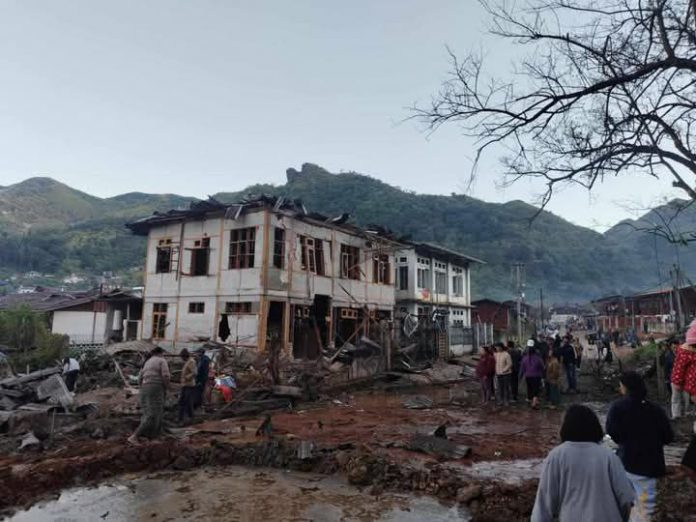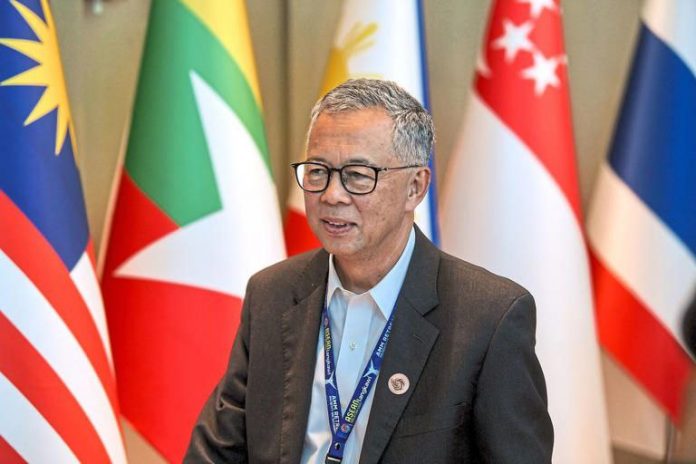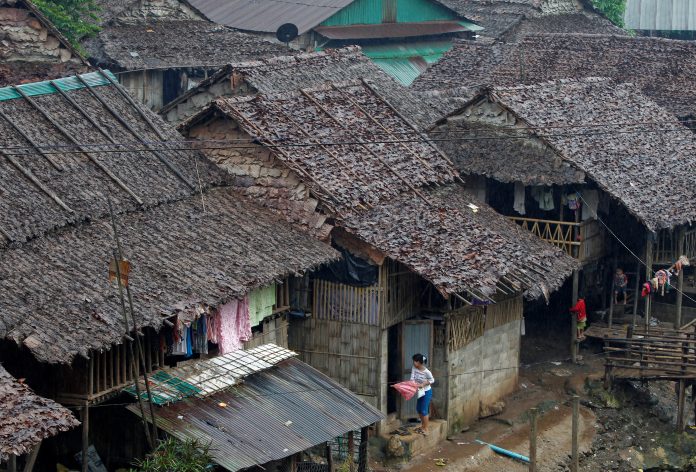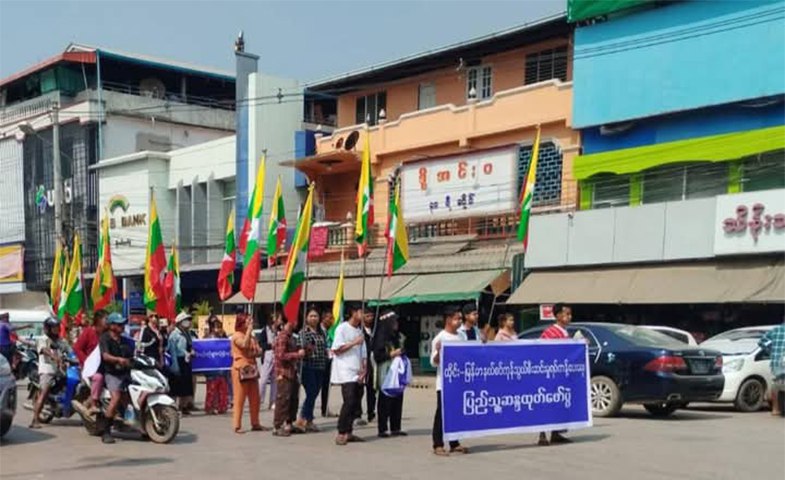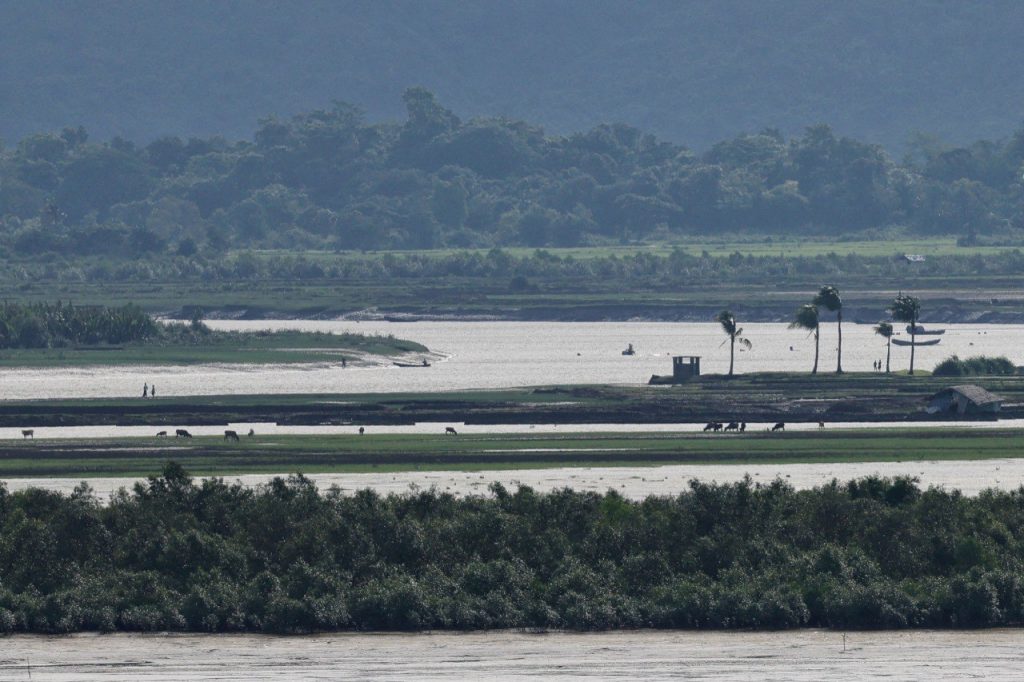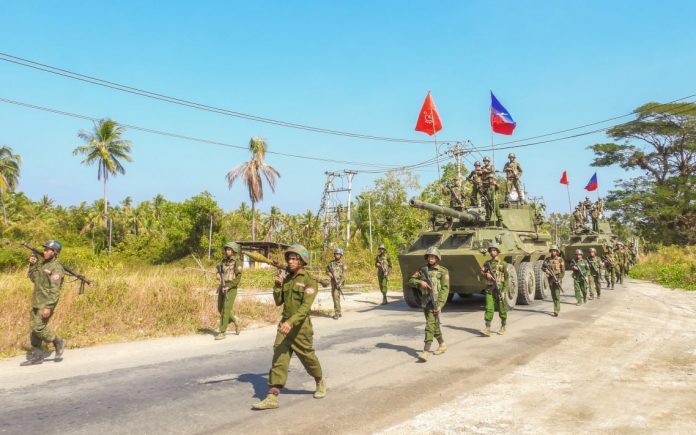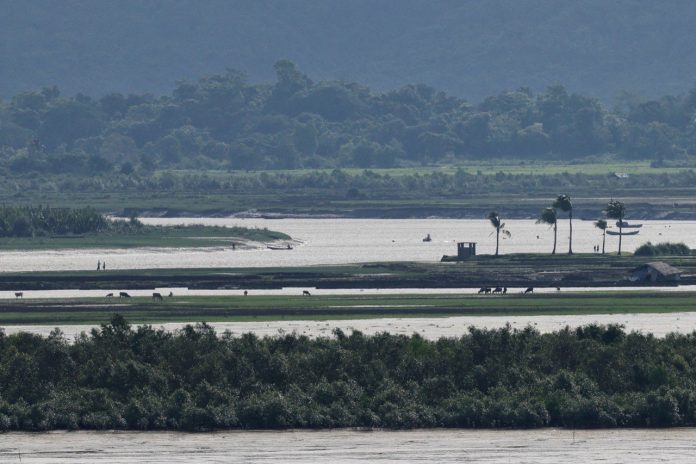Guest contributor
Shafiur Rahman
Starting on Aug. 7, a large portion of the Rohingya population of Maungdaw Township was forcibly evacuated by the Arakan Army (AA) under the pretext of civilian protection.
The conflict between the AA and the military had turned this once-bustling border town into a battleground. The AA claimed the displacement was necessary to safeguard civilians, yet for the tens of thousands of Rohingya uprooted from their homes, it has been a devastating calamity.
Food shortages, forced recruitment, indiscriminate shelling, and a complete breakdown in medical care and basic services forced many to undertake perilous journeys to Bangladesh.
The vanishing enclave
Maungdaw, located in northern Arakan (Rakhine) State, once represented a remaining stronghold for Rohingya life in Myanmar. After successive waves of violence in 2016 and 2017 drove more than 700,000 Rohingya to flee, the town of Maungdaw and a few nearby villages became the last enclaves where Rohingya communities tried to maintain some semblance of normalcy.
But when the AA’s fight for control of Rakhine escalated, they shut down supply routes and launched new offensives in these areas. By August 2024, another exodus of Rohingya from Maungdaw was underway.
The strangling blockade
For families in Maungdaw, warning signs appeared long before August. Harun, 21, a Rohingya shop owner and resident of Nolboinna village in Maungdaw, recalls how the AA’s blockade on supply routes drove up prices of essential commodities to astronomical levels.
“Before the blockade, a 50-kilogram bag of rice cost around 20,000 kyats. By June or July, the same sack had skyrocketed to 100,000 kyats,” he said. “Within weeks, we couldn’t afford even the basics. People began to ration every grain of rice.”
Other goods, such as cooking oil, fish, and vegetables, also became scarce or prohibitively expensive. Families struggled to feed themselves, sometimes surviving on a fraction of their usual intake.
“Normally, we used one kilogram of fish to feed our family,” Harun explained. “But we had to cut it down to 250 grams. Often, we couldn’t afford any fish at all, or we had no means to buy vegetables.”
Displacement in waves
As the AA and government forces clashed, many Rohingya in Maungdaw found themselves trapped in a cycle of forced displacement. Harun had to flee repeatedly – first to the eastern side of Nolboinna, then to Noya Fara, and finally to Hari Fara – two villages on the outskirts of Maungdaw.
“We never knew when the next attack would come,” Harun said. “At one point, we heard [Rakhine] had entered our area. We ran with only the clothes on our backs. My mother died in Hari Fara. Even then, we hardly had time to bury her properly before moving again.”
This constant flight took a heavy toll on families. They risked bombardment at every turn, and even when they reached a new location, the next offensive or threat of violence forced them to move on.
“We were always on edge,” Harun added. “No matter where we went, bombs were falling. People died in front of us. Some died in the street, some at home, and some by the beach while trying to escape. Every place was dangerous.”
Living in darkness
Well before the forced evacuation, the Rohingya in Maungdaw had been plunged into literal darkness. Electricity was cut off four months before August, leaving families reliant on candles, kerosene lamps, or solar panels, if they were fortunate enough to own one.
“Most people did not have solar panels. They couldn’t afford them or couldn’t carry them once the bombings started,” Harun recalled.
Communication networks went down around the same time. Phones and the internet became useless. “We couldn’t call anyone, couldn’t check on our relatives,” Harun said. “If someone died or needed help, there was no way to share the information.”
As a result, even news of major life events, like births or deaths, failed to reach extended families. “My relatives didn’t know my mother had died until we reached Bangladesh,” he added.
No safety, no shelter
Indiscriminate shelling made every inch of Maungdaw a potential death trap. Some families attempted to reinforce their homes with sandbags or brick walls; others dug small bunkers in their yards. Yet no measure guaranteed safety.
“We lived in fear of bombs hitting us indoors,” Harun said. “But we were also too afraid to go outside. It didn’t matter if you were in your house or in the street—you could be killed at any moment.”
An anonymous survivor from Guna Fara village in Maungdaw described how he and his family huddled in a makeshift well-like hole in their yard.
Standing for hours in dirty water led to skin infections, but it was the only way they felt even marginally safer from the drone attacks that rained overhead.
When food ran out, he attempted a dangerous crawl back to his home to retrieve rice.
“It should’ve been a ten-minute walk,” he said, “but it took two hours as I crawled through bushes to avoid being spotted by drones. I managed to get 20 kilograms of rice, but on my way back, the drones attacked our group. Thirteen people died in front of my eyes.”
Scarce water and medical neglect
As the conflict intensified, water sources became scarce and often contaminated. Ponds, tube wells, and mud wells, once lifelines in this rural area, were either unreachable or dried out from overuse.
“You can’t imagine how many people were sharing one tube well,” Harun said. “We had to queue for hours to fill even a single pot. Sometimes, if the pump was broken, we had no choice but to drink from mud wells.”
Medical care was virtually nonexistent. “For almost one and a half months before August, there was no access to treatment,” Harun explained.
Injuries that might have been treatable with first aid proved fatal without antibiotics, bandages, or medical supervision. “People would bleed to death from shrapnel. I saw many die because they couldn’t get help in time,” he said.
Some, like the anonymous survivor, sought medical help from the military after being hit by drone fragments. Surprisingly, he was granted basic treatment, though his family was not allowed to accompany him.
The rest of Maungdaw’s Rohingya, however, did not receive such assistance, and by the time people attempted to flee to Bangladesh, many were gravely wounded or already nearing starvation.
Forced out by violence
The AA’s role in displacing the Rohingya was explicit. They entered villages and forced residents to leave. Harun recalled how the AA also began targeting youth for forced recruitment.
“We heard they were capturing young men and keeping them in their territory,” he said. “Out of fear, and because of the bombings, we had no choice but to move toward the beach and try to cross into Bangladesh.”
Omar Khaled’s testimony takes it a step further, detailing abductions and systematic torture by the AA.
“They took us to a place called 4 Miles in Maungdaw,” he said. “We were blindfolded and handcuffed. We saw them drive nails into people’s feet, insert pipes into bodies to drain blood. Some were slaughtered outright.”
Omar describes how detainees were given just enough food to stay alive, and in some cases, forced to eat dog meat under threat. “If they refused, they were beaten.”
The violence escalated again on Sept. 9 when the military carried out an airstrike on the AA detention site where Omar was held. “Room 7 was hit directly – children, women, and even some AA soldiers died. I only survived because I was in Room 10.”
Collapsing livelihoods
The chaos in Maungdaw destroyed most families’ livelihoods well before they physically fled. Harun had a modest shop and owned livestock – 65 buffaloes plus goats.
“All were seized by the Arakan Army. I couldn’t argue with them,” he said. “I lost my shop, the money I’d invested, and eventually, my mother and my aunt.”
With the markets shut down and supply routes blocked, many people resorted to borrowing money or food from relatives and neighbors who had slightly more resources.
“We borrowed a sack of rice here, a bit of money there,” Harun recalled. “Sometimes, the person lending us food needed it just as badly. It was all out of desperation.”
A desperate exodus
By mid-August, the combined pressures of bombing, forced displacement, and fear of abduction made survival in Maungdaw untenable.
Harun and his remaining family members finally decided to leave on Aug. 25. “We saw so many people killed by bombs at the beach,” he said. “Over 300 bodies lay there, perhaps 500.”
They paid boat owners all the money they had, often supplemented with whatever jewellery the women were wearing. Harun’s father and some of his siblings were abducted by dacoits upon landing in Bangladesh, while Harun himself was intercepted by the Border Guard Bangladesh (BGB) and temporarily held.
After days of confusion, pushbacks, and paying ransoms to brokers or dacoits, the family was eventually reunited. “We paid 100,000 [taka] to free my father and one sister,” Harun says. “Another 80,000 [taka] for my two other sisters.”
Omar’s journey mirrored these hardships. After surviving torture, he escaped in chains, stumbling through the jungle for days. Local villagers helped cut off his shackles, and eventually he too reached Maungdaw’s coast to board a boat for Bangladesh.
Interception by the BGB led to pushback to Myanmar, but with the help of brokers, at a steep cost, he managed to cross into Bangladesh.
Life on the edge
Reaching Bangladesh hardly signaled the end of suffering. The Rohingya face a new set of hardships in overcrowded refugee camps, with limited access to healthcare, sanitation, and opportunities to earn a living.
For many, it feels like an endless cycle of persecution: driven out by one hostile group, only to find themselves unwelcome or exploited elsewhere.
Even more troubling is the fact that Maungdaw, the last significant Rohingya enclave in Myanmar, stands substantially emptied. While not everyone has left Maungdaw, large parts of this historically significant enclave now lie deserted.
Some estimates suggest that less than a quarter of the original population may still remain, though exact figures are difficult to confirm. Having already lost entire villages in 2016 and 2017, the Rohingya have now lost what remained of their homeland in Maungdaw town.
“We never expected to leave,” Harun admitted. “But we had no other choice. When bombs destroy your home and your mother dies in front of you, you run.”
Harun, Omar, and the anonymous survivor each represent a fragment of a much larger tragedy. Their stories echo the experiences of countless others who have lost homes, loved ones, and any sense of security.
In the hush that has fallen over Maungdaw, the Rohingya’s future in Myanmar appears more precarious than ever.
Shafiur Rahman is a journalist and documentary maker. He writes the Rohingya Refugee News newsletter.
DVB publishes a diversity of opinions that does not reflect DVB editorial policy. We’d like to hear what you think about this or any of our stories: [email protected]



